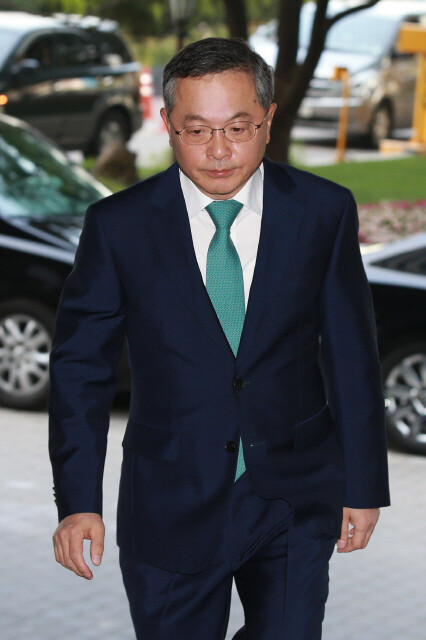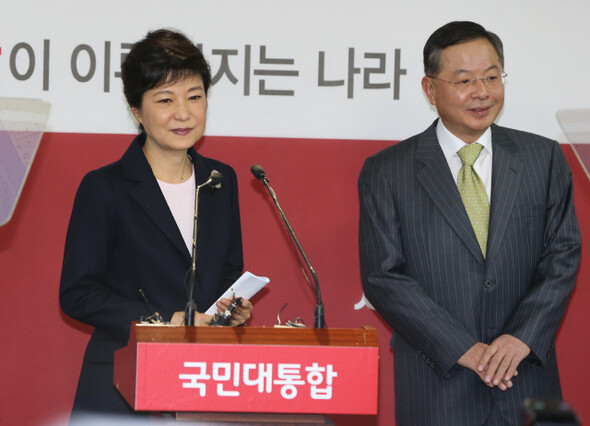hankyoreh
Links to other country sites 다른 나라 사이트 링크
Can new PM give Pres. Park a way out of the Sewol crisis?

By Seok Jin-hwan, Blue House correspondent
President Park Geun-hye’s nomination of former Supreme Court Justice Ahn Dae-hee for Prime Minister on May 22 is raising questions about whether the choice can save her and the ruling Saenuri Party from the crisis over the response to last month’s Sewol ferry sinking.
Ahn himself is seen by many as a potential rudder for the “human reforms” Park has declared, and a key presence for spearheading a future drive to reform government.
Political observers and Blue House responded favorably to Ahn’s nomination. Some analysts said it was one of the most surprising choices Park could have made considering her nomination pattern to date.
“I was not expecting her to go for Ahn Dae-hee at all,” said a senior government official and longtime Park aide on condition of anonymity. “The President obviously sees the current situation as extremely serious.”
The implication is that Ahn is not a choice Park would have made under normal circumstances.
Observers saw two possible reasons for Park’s decision: Ahn’s background, which would have suited him fairly well to Park’s declared goal of “reforming all aspects of society, including public officialdom,” and the expectation of smooth sailing through a National Assembly nomination hearing.
The first reason is, as head of the central investigations department (CID) for the Supreme Prosecutors’ Office (SPO) in 2013, Ahn quickly rose to prominence with criminal punishments against a series of big names, including associates of then-President Roh Moo-hyun, lawmakers on both sides of the aisle, and chaebol chairmen. His reputation earned him the nickname “the people‘s prosecutor,” with strong public support for his investigations. Now, his image as someone willing to go after “sacred cows” seems to have meshed with Park’s open calls for “remodeling the country.” Another consideration in the choice may be the awkwardness the opposition would face in openly opposing a candidate with Ahn’s image.
Secondly, Ahn’s background moving through the special investigations ranks as first, second, and third chief prosecutor in the department for the Seoul Central District Prosecutors’ Office was also reportedly a factor. It was seen as affording him a better grasp than anyone on the irregularities of government and its collusion with corporations, suiting him to Park’s stated aim of rooting out the so-called “government mafia.” As news spread of his nomination, politicians and the business world alike took notice of the fact that the administration had tapped a former CID head for Prime Minister and former SPO investigation planning officer Woo Byung-woo as civil affairs secretary. The placement of former CID prosecutors in the administration and Blue House was read as signaling the coming of a major investigation.
In addition, another major consideration may have been the fact that Ahn is expected to pass a nomination hearing without trouble, having already gone through one in 2006 when he was nominated to the Supreme Court. At the time of that hearing, his declared assets totaled around 800 million won (US$781,000), most of it tied up in an apartment in Seoul’s Gangbuk district. His relatively “managed” behavior since then - for example, not heading to a major law firm after finishing his Supreme Court term - also works in his favor of a relatively smooth passage.
Some of the factors working against Ahn are the fact that he is the second former prosecutor in a row nominated for Prime Minister, after the outgoing Chung Hong-won, and his history working for Park’s camp during the last presidential election, a position he quit immediately after she won.
It’s also uncertain whether Ahn will be able to offer the kind of “tough talking” and “hard truths” Park needs to hear once he does take office. Despite his tenacious image as a prosecutor, he made little impression during his previous foray into politics as head of the Saenuri Party’s Special Committee for Political Reform during the election. While he opposed the selection of former opposition lawmaker Han Kwang-ok to head the national integration committee, he also put up little resistance when Park decided to side with Han. Some legal observers said a 2003 investigation into presidential campaign funds was only possible because then-President Roh did not try to control the prosecutors or interfere with investigations.

Please direct questions or comments to [english@hani.co.kr]

Editorial・opinion
![[Column] Park Geun-hye déjà vu in Yoon Suk-yeol [Column] Park Geun-hye déjà vu in Yoon Suk-yeol](https://flexible.img.hani.co.kr/flexible/normal/500/300/imgdb/original/2024/0424/651713945113788.jpg) [Column] Park Geun-hye déjà vu in Yoon Suk-yeol
[Column] Park Geun-hye déjà vu in Yoon Suk-yeol![[Editorial] New weight of N. Korea’s nuclear threats makes dialogue all the more urgent [Editorial] New weight of N. Korea’s nuclear threats makes dialogue all the more urgent](https://flexible.img.hani.co.kr/flexible/normal/500/300/imgdb/original/2024/0424/7317139454662664.jpg) [Editorial] New weight of N. Korea’s nuclear threats makes dialogue all the more urgent
[Editorial] New weight of N. Korea’s nuclear threats makes dialogue all the more urgent- [Guest essay] The real reason Korea’s new right wants to dub Rhee a founding father
- [Column] ‘Choson’: Is it time we start referring to N. Korea in its own terms?
- [Editorial] Japan’s rewriting of history with Korea has gone too far
- [Column] The president’s questionable capacity for dialogue
- [Column] Are chaebol firms just pizza pies for families to divvy up as they please?
- [Column] Has Korea, too, crossed the Rubicon on China?
- [Correspondent’s column] In Japan’s alliance with US, echoes of its past alliances with UK
- [Editorial] Does Yoon think the Korean public is wrong?
Most viewed articles
- 1‘We must say no’: Seoul defense chief on Korean, USFK involvement in hypothetical Taiwan crisis
- 2N. Korean delegation’s trip to Iran shows how Pyongyang is leveraging ties with Moscow
- 3[Column] Park Geun-hye déjà vu in Yoon Suk-yeol
- 4Amnesty notes ‘erosion’ of freedom of expression in Korea in annual human rights report
- 5‘Weddingflation’ breaks the bank for Korean couples-to-be
- 646% of cases of violence against women in Korea perpetrated by intimate partner, study finds
- 7[Reportage] On US campuses, student risk arrest as they call for divestment from Israel
- 8“Parental care contracts” increasingly common in South Korea
- 9[Interview] Dear Korean men, It’s OK to admit you’re not always strong
- 10Korean government’s compromise plan for medical reform swiftly rejected by doctors